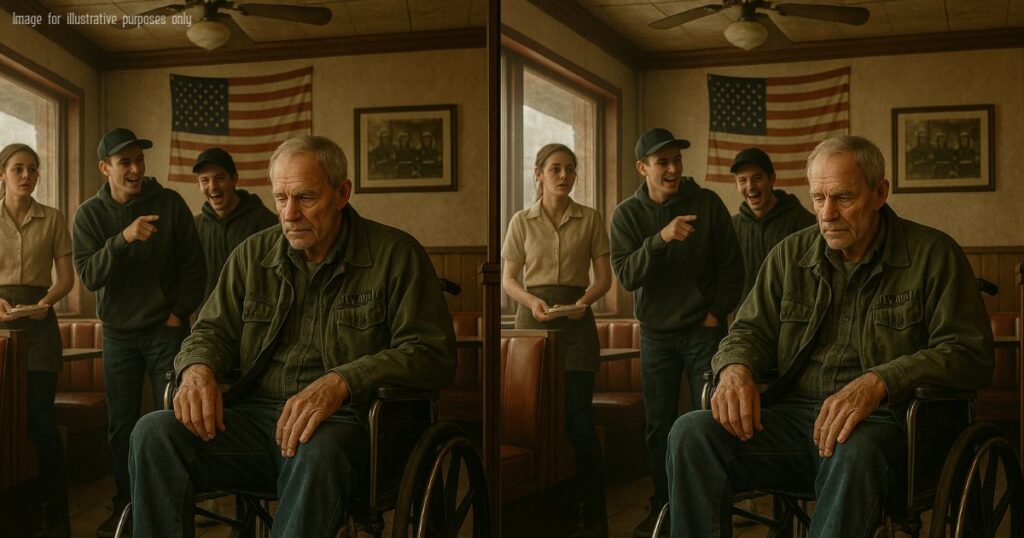It was late October when Tom got the letter.
Not the anonymous kind, not scribbled by hand or slipped into his mailbox under cover of night. This one came proper — white envelope, government seal, postmarked from D.C.
He turned it over once, then again. Something about official mail still made his chest tighten.
Inside was a formal invitation. Veterans Hall. Regional ceremony. They wanted to honor his service. Something about “community example,” “distinguished civic resilience.”
Tom almost laughed.
He wasn’t a speech man. Never had been. He’d rather mow lawns in the rain than sit behind a microphone. But then he remembered that kid — the one who laughed at him in the diner. And the one who listened beside the stone slab.
Maybe it was time.
The town’s old VFW hall had been patched up for the occasion. Red-white-blue bunting hung from the rafters, more plastic than cloth these days. The air smelled like folding chairs and overcooked hot dogs.
Tom rolled in alone.
He wore his pressed Army shirt — the same one Ellen had kept ironed in the closet for decades, “just in case.” His medals still shined. His wheelchair creaked louder than he remembered.
An emcee from the mayor’s office spoke first. Too many words. Big ones that bounced off walls but didn’t stick.
Then they called his name.
People stood.
And for a moment, it all went quiet.
Tom looked out at the crowd — young faces, old hands, uniforms, worn denim. He cleared his throat, the mic squealing in protest. Then he leaned forward, voice low and steady.
“I didn’t come here to be thanked,” he began. “I came because silence can start to feel like surrender.”
He paused. Took a breath.
“When you get older, people start looking past you. Like you’re a story they’ve already heard. But I’m here to tell you — some stories haven’t even begun until they’re told out loud.”
He pointed to the front row, where three students from the local high school sat — the girl with her father’s tags, the camo hoodie kid, and the diner boy.
“I was called a liar for needing this chair. But I earned it. Not for the wounds, but for carrying what others couldn’t bring home. Names. Memories. Truths.”
He gripped the podium, knuckles pale.
“We live in a country where flags still rise. Where kids still ask questions. Where one old man raising a new flag can start something that wasn’t there the day before. That’s what I fought for.”
The room stayed silent when he finished.
Then came the clapping. Not loud. Not explosive.
But steady. Strong. Like boots marching in rhythm.
He looked down at his lap — his hands shaking, not from age this time, but from release. From the weight he didn’t realize had been growing heavier for years.
Ed caught his eye from the back row. Nodded once. That was enough.
A week later, someone replaced the sign at Tom’s flagpole.
Not him.
He found it one morning, freshly painted.
“The flag flew higher because he did.”
— Your neighbors
Below it were small red flowers, a candle, and three hand-drawn notes from schoolchildren.
One read:
“Dear Mr. Granger, I told my grandpa what you said in class. He hugged me for the first time in five years.”
Another said:
“I thought patriotism was corny until I met you.”
The last was scribbled in pencil, crooked letters on ruled paper:
“When I’m a soldier, I want to be kind like you.”
That winter, Tom’s health faded.
The cold made the joints scream louder than usual. He didn’t get out as much. Neighbors started checking in — bringing soup, shoveling the walk.
The boy from the diner stopped by every Friday, just to listen. Sometimes Tom told stories. Sometimes he just sat and watched the wind play in the flag.
One evening, as snow began to fall in soft sheets, the boy asked, “Do you regret not yelling back that day? At me?”
Tom smiled. His voice came thin, but steady.
“No,” he said. “Because if I’d shouted, you might’ve walked away. But silence — silence made you come closer.”
Tom passed quietly one morning in February. Peaceful. Hand resting on an old photo. Flag flying above.
At his funeral, they didn’t play a trumpet or read a prepared eulogy.
Instead, the town stood in a circle, holding candles. And one by one, they said his name.
The girl with the dog tags. The camo boy. Ed. Kenzie from the diner. Even the school principal.
And last, the boy who once pointed and laughed, now taller, older, eyes damp.
“He didn’t just teach me to respect veterans,” he said, voice shaking. “He taught me how to listen before I judge. He taught me what strength really looks like.”
Then he turned to the flag.
Saluted.
And the wind picked up — just enough to make the stars ripple, like they knew.
Final Line:
He never raised his voice — but somehow, the whole town heard him.


